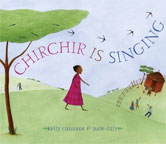I know, I know: you haven't been hearing from Alysa much lately. You keep having to skim Andie's writing while you wait for the masterful Alysa to submit another entry. I get it, really I do. I know she just posted the other day and I loved reading her piece (don't tell her that, okay?). I know she is busy with school work and just being a teen. Plus I keep finding these books I enjoyed reading and I like to share so here you go, another from me!
Remembering Mrs. Rossi is a keeper. What a sweet, gentle, engaging story from Amy Hest. She is a prolific author-- I know her from her Baby Duck books. This one captivated me because of its gentle insistence about family. The storyline starts with Mrs. Rossi having recently died, and the dad and Annie the daughter are trying to find their way to live after that loss. There is nothing sappy about this book, sad as the subject may be; in fact, the writing holds this quiet hope for the two of them finding their way together. Both the father and daughter worry about losing their memories of their wife/mother, and like most hopeful juvenile books, the 2 find a way to work together to maintain their memories and their togetherness.
I like the gentleness of this book. I wonder how much of Amy Hest' experience of losing her own mother lives within this book, and I wonder what makes her smile about it. I guess when my mother passes (which hopefully is not any time soon!), I will be able to let her go while keeping her alive with the same calm that Hest offers in this book.







